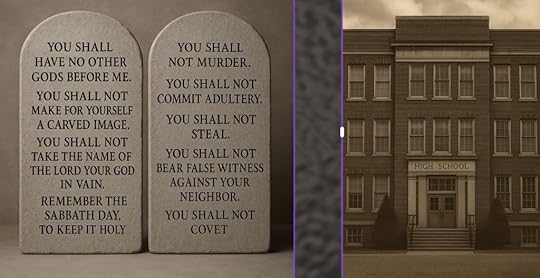Here We Go Again!
 Screenshot
ScreenshotMy relief about last month’s Supreme Court’s decision not to allow Oklahoma to open the nation’s first publicly funded Catholic charter school may have been premature. I knew the decision was narrow and ended in a tie, with Justice Barrett recusing herself, but at least the court “affirmed last year’s Oklahoma Supreme Court decision that the concept of a publicly funded Catholic charter school is unconstitutional.” (oklahomavoice.com)
The first amendment to our Constitution unequivocally states, “”Congress shall make no law respecting an establishment of religion, or prohibiting the free exercise thereof.” The Court’s tie ruling, however, suggests some openness to dismantling that separation. Our current administration insists that we are a Christian country despite the clarity of the amendment’s statement.
In 1980 in Stone v. Graham, the Court found that Kentucky’s requirement to post the Ten Commandments in schools “violated the Establishment Clause of the Constitution. The Court found that the requirement that the Ten Commandments be posted ‘had no secular legislative purpose’ and was ‘plainly religious in nature.’ The Court noted that the Commandments did not confine themselves to arguably secular matters (such as murder, stealing, etc.), but rather concerned matters such as the worship of God and the observance of the Sabbath Day.” (www.oyez.org )
Despite precedents like that, a year ago, Louisiana Governor Jeff Landry signed a bill into law mandating that the Ten Commandments be posted in every classroom in the state and said, ““I can’t wait to be sued.” Last November, U.S. District Judge John deGravelles that “the law is ‘facially unconstitutional’ and ‘in all applications,’ barring Louisiana from enforcing it and adopting rules around it that obligate all public K-12 schools and colleges to exhibit posters of the Ten Commandments.” (nbcnews.com)
When this case reaches the Supreme Court, the outcome should be a no-brainer. Constitutional law scholar Sanford Levinson warns, however, that the current Court’s willingness to dispense with past precedents may lead to a different decision. (hls.harvard.edu )
And Louisiana is not alone. This fall every school in Texas must post a copy of the Ten Commandments, and they will not be permitted to post any alternatives: “the bill requires every classroom to visibly display a poster sized at least 16 by 20 inches. The poster can’t include any text other than the language laid out in the bill, and no other similar posters may be displayed.” (texastribune.com)
Other states have climbed on this bandwagon. In 2024, Arizona Governor Katie Hobbs vetoed a state senate bill that would have permitted posting the Ten Commandments in schools. Last summer Utah passed a bill “adding the Ten Commandments along with the Magna Carta to a list of approved historical documents and principles allowed to be studied in public schools.” The final watered-down version that passed removed the requirement and made the display optional. (abc4news.com) In Oklahoma, House Bill 1006, which failed last year, has been revived and would require a poster or a framed copy of the Ten Commandments to be posted in a conspicuous place in every public school classroom in Oklahoma, the same state where Education Superintendent Ryan Walters “ordered public schools to keep a copy of the Bible in every classroom and incorporate the Christian text into lesson plans. Several district leaders have said they won’t comply, and a lawsuit is challenging the order.” (oklahomavoice.com)
The Supreme Court has weakened the doctrine of separation of church and state before. In 2005 in Van Orden v. Perry, a lawsuit about a monolith displaying the Ten Commandments being placed at the Texas state capitol after being donated by a private group, the Court determined that, “The Establishment Clause does not prohibit per se all forms of government action that may have religious content or a religious message.” (supremejustia.com) In the 2019 Kennedy v. Bremerton case, the Court determined that the football coach had the right to pray on the high school football field after a game, where he could be joined by players. (www.law.cornell.edu)
I fear that the current US Supreme Court will continue to make decisions that erode the separation of church and state. Mandated posting of the Ten Commandments excludes other religions along with atheists and agnostics. It has no part in our public square. Our founding fathers were not anti-religion, but they sought relief from the enforcement of any single religion. I believe in an inclusive and welcoming space for all learners. Religious instruction has been a private matter and must remain so.



